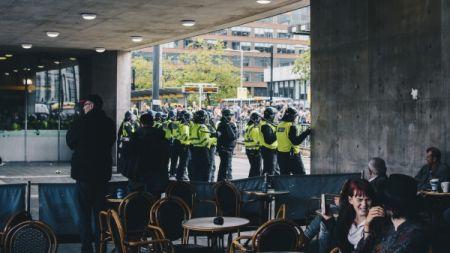On 21 April 2017, High Court in Shah Alam allowed the judicial review application by Fahmi Zainol and four other former University of Malaya (UM) students. In their application, Fahmi and his colleagues sought to declare the disciplinary action taken against them for organising an event with Anwar Ibrahim as the main speaker at UM in 2014 as illegal.
The event was held on 27 October 2014, the night before Anwar went to court to challenge his second sodomy conviction. Fahmi defended his decision to organise the event despite repeated warnings by the University stating that he felt that Anwar, as the federal Opposition leader at the time, had the right to deliver his speech. Meanwhile, UM, viewing the event as an illegal activity, issued prohibitory notices and barred them from entering the event venue. However, at about 9pm that night, the University gates were forced open and approximately 1000 students and participants entered the grounds to hear Anwar speak.
Fahmi faced suspension for two semesters and was fined RM600.00 while the other four students received penalties ranging from stern warning to semester-long suspension and fines.
In allowing the judicial review application against the penalties imposed by UM’s Disciplinary Committee, the High Court considered five legal issues and ultimately concluded that the disciplinary proceedings taken against the students were not conducted in accordance with the University of Malaya (Discipline of Students) Rules 1999 (‘the Rules’).
ISSUE 1: Legal Representation
The students raised the issue that they were not informed of their right to legal representation. However, the High Court found these to be untenable grounds. The High Court held that there was no such obligation on the part of the University’s Disciplinary Committee to inform the applicants of their right to be represented by a lawyer at their disciplinary hearing. Furthermore, there is no absolute right to legal representation in disciplinary proceeding cases before a tribunal.
ISSUE 2: Unconstitutionality of the University of Malaya (Discipline of Students) Rules 1999
The students alleged that the Rules was unconstitutional as it is in breach of Articles 5, 10 and 13 of the Federal Constitution, which protect the rights to life and liberty, freedom of speech, assembly and association, and to property. However, the judicial review also failed on this ground. The court upheld the legality of the Rules as the Board has the power to implement such rules under the University and University Colleges Act 1971 (UUCA). The students’ counsel had confirmed that they were not challenging the constitutionality of the UUCA and were thus prevented from doing so as they had not obtained leave from the Federal Court.
ISSUE 3: Procedural Non-Compliance of Rules 53 and 54 of the Rules
The High Court allowed the students’ judicial review application on the grounds of procedural noncompliance. Under Rules 53 and 54, the Disciplinary Committee was required to first establish that there was a case to answer and only then call the students to enter their defence. This procedure, reflecting the proper procedure for fair trial, was disregarded. Further, the students were also not given the opportunity to re-examine their witnesses in clear denial of their right under Rule 54.
ISSUE 4: Procedural Impropriety
The High Court also allowed the judicial review application on the ground of procedural impropriety, i.e. for the failure of university to state the standard of proof applicable in their decision making. Also, the entire proceeding took only about 12 hours although it involved 5 students with 17 separate amended charges. The High Court deemed this as hurried justice.
In this regard, the University argued that non-compliance of Rules 53 and 54 was merely a procedural matter; thus fulfilment of natural justice principle alone by way of the Disciplinary Committee proceedings alone was sufficient. Further, it is not necessary for disciplinary proceedings to adhere to strict rule of law. This line of argument was rejected by the High Court because the Rules were made by the University.
ISSUE 5: Breach of Natural Justice
Aside from that, the students argued that the University’s non-compliance of the Rules has caused injustice and/or prejudice to them. It also infringed the fundamental rights of the students to be heard and have a fair hearing according to the Rules. Failure of the University to abide by the Rules in this regard resulted in a breach of natural justice. The High Court emphasised the need for natural justice to be observed. In light of the above, the High Court allowed the application for judicial review.
The University appealed to the Court of Appeal on the same issues raised in the High Court. On 31 October 2017, the Court of Appeal unanimously dismissed the appeal. Subsequently, the University applied for leave to appeal to the Federal Court. However, the Federal Court found the University’s questions to be decided during the appeal were neither novel nor of public importance as required under s 96(a) of the Courts of Judicature Act 1964. The leave application was therefore dismissed without costs.
Part Two will examine what happened at the Court of Appeal.



